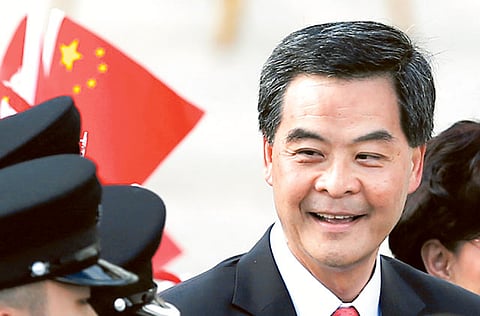‘CY’ Leung: Hong Kong’s new leader
Critics contend that administration will continue with business as usual

Hong Kong: Hong Kong’s new leader Leung Chun-ying takes over the city of seven million people amid falling popularity ratings, a series of setbacks and protests over his leadership before he even started his term.
Born in 1954, Leung — the 57-year-old son of a policeman — is known as a self-made property consultant and, most recently, as the soft-spoken convener of the Executive Council, the city’s top policy-making body.
His family hails from China’s eastern Shandong province but he proudly asserts that he was born and bred in Hong Kong, the Cantonese-speaking former British colony reunited with China exactly 15 years ago.
“If we work together, I am sure Hong Kong — the Pearl of the Orient — will sparkle again,” he said in his inauguration speech on Sunday, before shaking hands with China’s visiting President Hu Jintao.
:Every Hong Konger should enjoy the fruits of Hong Kong's development,” Leung said. “I will try my best to safeguard the civil liberties of every resident, protect press freedom and defend the impartiality of the media.”
But he is seen as close to Beijing and his many critics among Hong Kong’s public contend that his administration will continue with business as usual, favouring a tiny elite of tycoons over the masses.
Better known by the initials CY, Leung has attracted protests by thousands of people since he was elected in March by a 1,200-strong committee packed with members of pro-Beijing elites, rather than by universal suffrage.
Leung studied surveying in Hong Kong and real estate management in Britain before returning to his hometown in 1977 and joining the local office of global property firm Jones Lang Wootton.
He rose to become one of the best known figures in the city’s influential property sector, as Asia-Pacific chairman of real estate advisory firm DTZ Holdings.
At just 34, Leung was named secretary-general of the high-powered Basic Law Consultative Committee, tasked with drafting the city’s constitution after its return to Chinese rule.
More than 20 years later, his main rival for the chief executive post was business and government insider Henry Tang, the son of a Shanghai textile baron, whom most observers saw as a shoo-in for the job.
But Leung’s more confident style and populist proposals — including promises to address corruption, the wealth gap and soaring housing prices — put him well ahead of Tang in terms of popular approval ratings at the time.
He watched calmly as Tang’s campaign imploded in a series of verbal gaffes and personal scandals, which helped to overshadow questions about his own background.
Beijing did not openly switch sides but when the electoral committee voted, Leung had a clear majority over Tang: 689 to 285.
Just a week before his inauguration, though, Leung was forced to apologise over illegal home improvements of his own and faced criticisms from an inquiry into a conflict-of-interest row in a government project a decade ago.
The thousands who protested at his selection condemned it as the result of interference by Beijing - which has promised direct elections from a pool of vetted candidates only for 2017.
A poll released by the University of Hong Kong last week showed Leung’s popularity rating falling to 51.5, down 4.2 points from a month ago, with nearly 40 per cent of people saying they did not trust the government.
Apart from the clamour for political reform, the most persistent public complaint is over quality of life. The vast majority of Hong Kongers live in cramped apartments, and most cannot afford to own even a one-bedroom flat.
Leung, who is married with three teenage children, says he finds gardening “therapeutic”, loves hiking and football, and swims every night at his private pool.
Sign up for the Daily Briefing
Get the latest news and updates straight to your inbox



